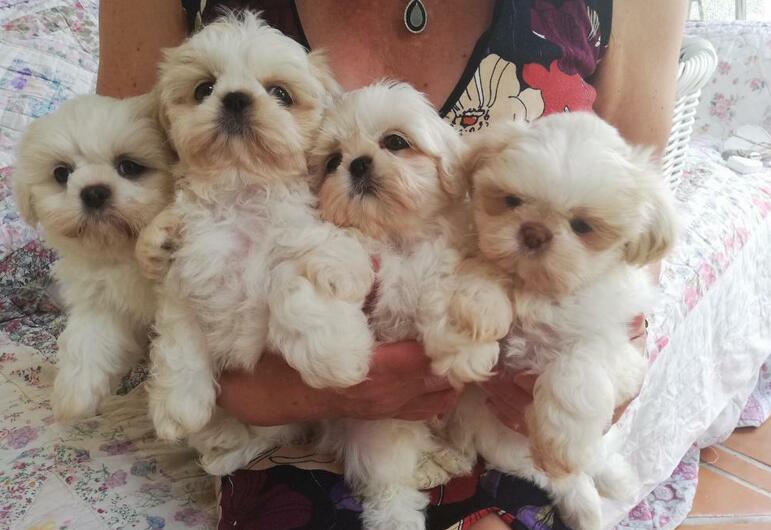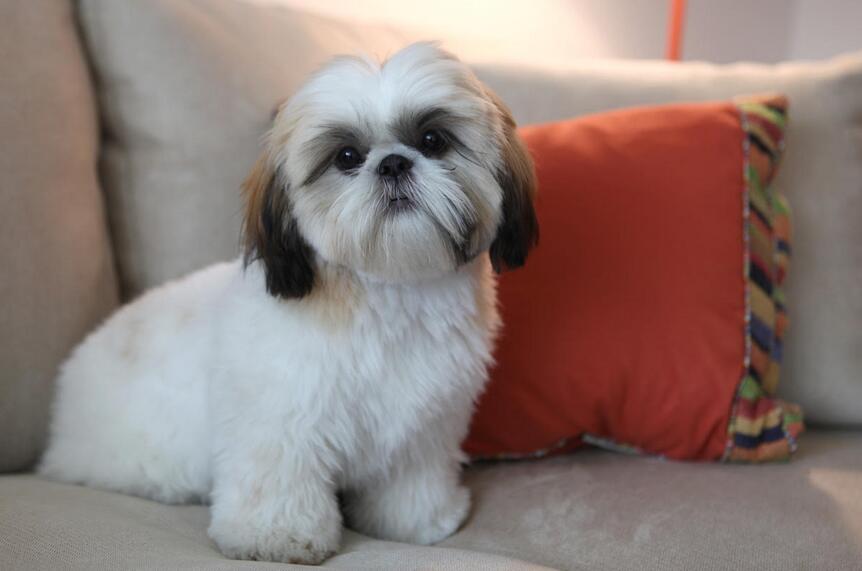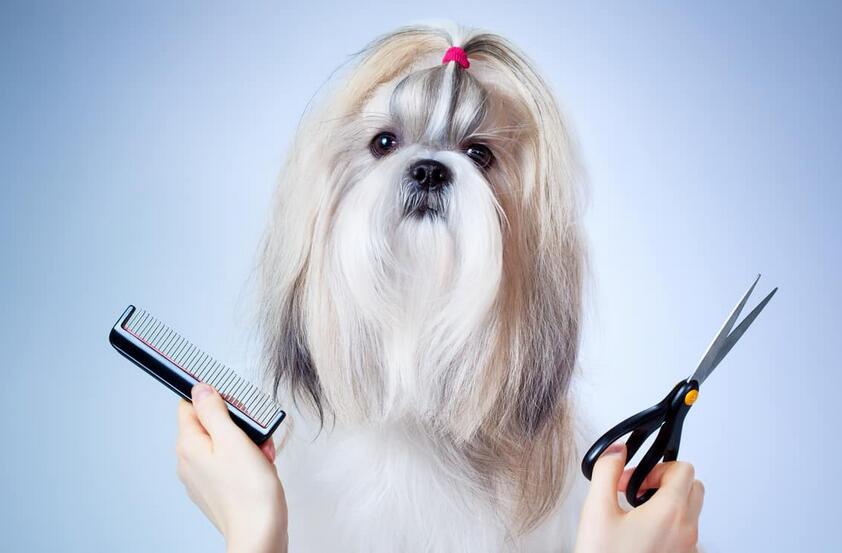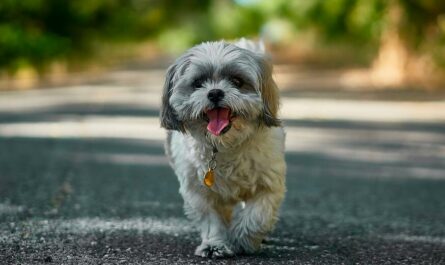Note: This comprehensive guide provides in-depth knowledge and essential information about Imperial Shih Tzus, including their characteristics, health and wellness, grooming needs, training tips, living conditions, and more. Whether you are a potential owner or a Shih Tzu enthusiast, this guide will help you understand and appreciate this regal breed.
What is Imperial Shih Tzu?
The Imperial Shih Tzu is a small and elegant breed known for its charming personality and luxurious coat. In this guide, we will explore everything you need to know about the Imperial Shih Tzu, from its origins to its health, grooming, and training needs. Whether you’re considering adding an Imperial Shih Tzu to your family or already have one, this guide will provide valuable insights for a fulfilling and rewarding experience.
Difference between an Imperial Shih Tzu and a Regular Shih Tzu
The main difference between an Imperial Shih Tzu and a Regular Shih Tzu is the size. An Imperial Shih Tzu is much smaller than a Regular Shih Tzu. Imperial Shih Tzu is typically between 3 and 7 pounds, while Regular Shih Tzu generally is between 9 and 16 pounds.
In terms of physical appearance, both breeds have a similar look: a long, silky coat, erect ears, and a protruding nose. However, an Imperial Shih Tzu looks more delicate and refined than a Regular Shih Tzu.
Temperament-wise, both breeds are intelligent, loyal, and affectionate. However, the Imperial Shih Tzu is usually calmer and more laid back than its larger counterpart.
Given their small size, Imperial Shih Tzus require less exercise than Regular Shih Tzus. They can live happily in an apartment and do not need to be taken for long walks.
1. Understanding the Imperial Shih Tzu
Physical Characteristics
Imperial Shih Tzus are slightly smaller than their standard counterparts. They typically weigh between 6 to 9 pounds and stand around 8 to 11 inches tall. These adorable dogs have a compact body, a short muzzle, and expressive eyes. Their coat comes in various colors, including gold, silver, black, and white, and is long and luxurious, requiring regular grooming to maintain its beauty.
Temperament and Personality
Imperial Shih Tzus are known for their loving and affectionate nature. They form strong bonds with their owners and thrive on human companionship.
They are generally friendly and get along well with children and other pets when properly socialized. These intelligent dogs are eager to please, but they can also be a bit stubborn at times, so consistent training and positive reinforcement are key.
Imperial Shih Tzus are also known for their regal and confident demeanor. Despite their small size, they carry themselves with poise and grace. Their confident nature makes them well-suited for various living conditions, including apartments or houses with yards.
2. The Imperial Shih Tzu’s Health and Wellness
Common Health Issues
While the Imperial Shih Tzu is generally a healthy breed, they may be prone to certain health issues. These include brachycephalic airway syndrome, dental problems, patellar luxation, eye conditions such as cherry eye and progressive retinal atrophy, and respiratory issues due to their short muzzle.
Regular veterinary check-ups, a nutritious diet, and regular exercise can help maintain the overall health and well-being of your Imperial Shih Tzu.
Diet and Nutrition
A well-balanced diet is crucial for the health of your Imperial Shih Tzu. Choose a high-quality dog food that is specifically formulated for small breeds. Ensure that the food provides all the necessary nutrients, including proteins, carbohydrates, healthy fats, vitamins, and minerals.
Avoid overfeeding, as obesity can lead to various health issues. Consult your veterinarian for personalized dietary recommendations based on your dog’s age, weight, and activity level.
In addition to a balanced diet, it’s important to provide fresh and clean water at all times. Hydration is key to maintaining your Imperial Shih Tzu’s overall well-being.
Exercise Requirements
Although the Imperial Shih Tzu is a small breed, they still require regular exercise to stay healthy and happy. Daily walks, interactive play sessions, and mental stimulation activities are essential for their physical and mental well-being.
However, it’s important to note that their exercise needs are not as demanding as larger breeds. Be mindful of their limitations and avoid excessive physical exertion.
Engaging in play activities with your Imperial Shih Tzu, such as puzzle toys or gentle training sessions, can provide both exercise and mental stimulation. These activities help keep their minds sharp and prevent boredom.
3. Grooming Your Imperial Shih Tzu
Daily Grooming Tips
The long and luscious coat of an Imperial Shih Tzu requires regular grooming to prevent matting and keep it looking its best. Daily brushing is recommended to remove tangles and keep the coat clean. Use a slicker brush or a comb with wide teeth to gently remove any knots or debris. Pay special attention to the areas around the ears, armpits, and tail, as these are prone to matting.
Regular brushing not only keeps the coat in good condition but also helps you bond with your Imperial Shih Tzu. Make grooming sessions a positive and enjoyable experience by offering treats and praise.
Professional Grooming
In addition to daily grooming, regular visits to a professional groomer are essential to maintain the overall appearance of your Imperial Shih Tzu.
Groomers can trim the hair around the eyes to prevent irritation and improve visibility. They can also provide professional bathing, nail trimming, and ear cleaning services. A well-groomed Imperial Shih Tzu not only looks beautiful but also feels comfortable.
During grooming sessions, it’s also important to check your Imperial Shih Tzu’s ears, teeth, and nails. Clean the ears regularly to prevent infections, brush their teeth to maintain good oral hygiene, and trim their nails to keep them at a comfortable length. If you’re unsure about how to perform these tasks safely, consult a professional groomer or your veterinarian.
4. Training Your Imperial Shih Tzu
House Training
House training is an important aspect of raising any dog, including an Imperial Shih Tzu. Consistency, positive reinforcement, and patience are key to successful housebreaking.
Establish a routine for regular bathroom breaks and reward your dog with treats and praise when they are eliminated in the appropriate spot. Crate training can also be beneficial in teaching your Imperial Shih Tzu bladder control and creating a safe space for them.
It’s important to be patient during the house training process, as accidents may happen. Avoid punishment, as it can create fear and confusion in your Imperial Shih Tzu. Instead, focus on positive reinforcement and set your dog up for success by providing frequent opportunities for outdoor elimination.
Obedience Training
Obedience training is crucial to ensure that your Imperial Shih Tzu is well-behaved and responsive to commands. Start with basic commands such as sit, stay, and come, using positive reinforcement techniques like treats and praise. Training sessions should be short and fun to keep your dog engaged. Consider enrolling in a puppy obedience class or seeking the help of a professional dog trainer to enhance your training efforts.
In addition to basic obedience training, socialization is an important aspect of your Imperial Shih Tzu’s development. Expose them to various people, animals, and environments to help them become well-rounded and confident companions. Proper socialization from an early age can prevent behavioral issues and promote a harmonious relationship between your Imperial Shih Tzu and the world around them.

5. Living with an Imperial Shih Tzu
Ideal Living Conditions
Imperial Shih Tzus are well-suited for apartment living due to their small size and moderate exercise requirements. However, they can adapt to various living situations as long as they receive adequate attention, mental stimulation, and exercise.
Whether you live in an apartment or a house with a backyard, ensure that your Imperial Shih Tzu has a safe and comfortable environment to thrive in.
Most Imperial Shih Tzus lead a healthy and average life between 12 to 16 years. However, the age span can vary if that dog has serious health problems.
Traveling with Your Imperial Shih Tzu
If you love to travel, you’ll be happy to know that Imperial Shih Tzus can make great travel companions. Whether it’s a road trip or a flight, a few considerations can ensure a smooth journey.
Invest in a comfortable travel carrier, bring familiar items such as bedding and toys, and plan for frequent breaks to allow your dog to stretch their legs and relieve themselves. Research pet-friendly accommodations and airlines in advance to ensure a stress-free trip for both you and your furry friend.
When traveling with your Imperial Shih Tzu, it’s important to prioritize their safety and comfort. Ensure that their travel carrier is well-ventilated and secure. Pack their favorite toys, blankets, and other familiar items to provide a sense of security during the journey.
Additionally, consult your veterinarian before traveling to ensure that your Imperial Shih Tzu is up-to-date on vaccinations and to address any specific travel concerns.
6. Breeding and Purchasing
Finding a Reputable Breeder
When considering purchasing an Imperial Shih Tzu, it’s essential to find a reputable breeder who prioritizes the health and welfare of their dogs. Look for breeders who provide proper care, health screenings, and socialization for their puppies.
Ask for references, visit the breeder’s facility, and ensure they are knowledgeable and transparent about their breeding practices. Avoid backyard breeders or puppy mills that prioritize profit over the well-being of the dogs.
Finding a reputable breeder is crucial to ensure that your Imperial Shih Tzu is healthy and comes from a responsible breeding program. Reputable breeders prioritize the health and temperament of their dogs and strive to produce puppies that conform to breed standards. They provide proper care, socialization, and health testing for their dogs, ensuring you receive a healthy and well-adjusted puppy.
Adoption Options
Adopting an Imperial Shih Tzu from a rescue organization or a shelter is a wonderful option. Many Imperial Shih Tzus need loving homes and can make fantastic companions.
Adoption fees are typically lower than purchasing from a breeder, and you have the satisfaction of giving a deserving dog a second chance at a happy life. Search online or visit local rescue organizations to find an Imperial Shih Tzu waiting for their forever home.
Adopting an Imperial Shih Tzu not only provides a loving home for a dog in need but also supports the efforts of rescue organizations. These organizations work tirelessly to rescue, rehabilitate, and rehome animals. By adopting, you are directly contributing to their mission of saving lives and promoting responsible pet ownership.
7. The Cost of Owning an Imperial Shih Tzu
Initial Costs
Imperial Shih Tzu puppy can cost $1,900 on average. However, a high-quality purebred Imperial Shih Tzu could range between $1,800 to $3,600 and more. The price may vary depending on the breeder
The cost of acquiring an Imperial Shih Tzu includes the purchase price or adoption fee, as well as initial supplies such as food bowls, a leash, a collar, bedding, and toys.
Additionally, you should budget for the first veterinary visit, vaccinations, and microchipping. The initial costs may vary, but it’s important to be financially prepared for the responsibilities of owning a dog.
It’s worth mentioning that the initial costs are just the beginning of your financial commitment to your Imperial Shih Tzu. Ongoing expenses such as food, grooming, veterinary care, and parasite prevention should also be factored into your budget.
Responsible pet ownership requires financial planning to ensure that your Imperial Shih Tzu receives the best care throughout your life.
Ongoing Expenses
As a responsible owner, you should be prepared for the ongoing expenses associated with owning an Imperial Shih Tzu. These include high-quality dog food, regular veterinary check-ups, grooming services, vaccinations, parasite prevention, and occasional medical treatments. It’s wise to set aside a monthly budget for these expenses to ensure your Imperial Shih Tzu receives the best care possible.
It’s important to prioritize your Imperial Shih Tzu’s health and well-being. Regular veterinary check-ups not only help prevent and detect any potential health issues early on but also provide an opportunity to discuss your dog’s specific needs with your veterinarian.
Grooming services, such as professional bathing, haircuts, and nail trimming, help maintain your Imperial Shih Tzu’s hygiene and appearance. Additionally, budgeting for high-quality dog food and treats ensures that your dog receives the necessary nutrition to thrive.
8. Joining the Imperial Shih Tzu Community
Clubs and Organizations
Being part of the Imperial Shih Tzu community can be a rewarding experience. Look for breed clubs and organizations that provide valuable resources, support, and opportunities to connect with other Imperial Shih Tzu enthusiasts. These groups often organize events, shows, and educational seminars where you can learn more about the breed and build lasting relationships with fellow owners.
Breed clubs and organizations dedicated to the Imperial Shih Tzu breed are an excellent source of information, support, and camaraderie. These clubs often hold events such as specialty shows, obedience trials, and social gatherings where you can meet fellow Imperial Shih Tzu enthusiasts and learn from experienced breeders and exhibitors.
Participating in these activities allows you to showcase your Imperial Shih Tzu, learn more about the breed’s history and standards, and form connections within the community.
Online Forums and Social Media Groups
The internet offers a wealth of online forums and social media groups dedicated to the Imperial Shih Tzu breed. Joining these communities allows you to engage in discussions, seek advice, and share your experiences with like-minded individuals.
These platforms provide a fantastic opportunity to learn from experienced owners, discover helpful tips, and showcase your beloved Imperial Shih Tzu.
Online forums dedicated to the Imperial Shih Tzu breed are a treasure trove of information and support. Joining these forums allows you to ask questions, share experiences, and learn from the collective knowledge of the community.
Social media platforms, such as Facebook groups or Instagram communities, also provide a platform for Imperial Shih Tzu owners to connect and share their love for the breed. Engaging with these online communities can be both educational and enjoyable as you connect with fellow Imperial Shih Tzu enthusiasts from around the world.
Frequently Asked Questions
1. How long do Imperial Shih Tzus live?
On average, Imperial Shih Tzus have a lifespan of 12 to 16 years. However, with proper care, some can live even longer, reaching their late teens.
2. Are Imperial Shih Tzus good with kids?
Yes, Imperial Shih Tzus is generally good with kids. However, it’s important to supervise interactions and teach children how to handle and respect dogs to ensure a harmonious relationship.
3. How much exercise does an Imperial Shih Tzu need?
Imperial Shih Tzus requires moderate exercise, including daily walks and interactive play sessions. Aim for at least 30 minutes to an hour of exercise per day, tailored to their age and energy level.
4. Do Imperial Shih Tzus shed a lot?
Imperial Shih Tzus have a long, luxurious coat that requires regular grooming, but they are considered a low-shedding breed. However, regular brushing is necessary to prevent matting and keep their coat healthy.
Conclusion
In conclusion, the Imperial Shih Tzu is a delightful and regal companion that brings joy and love to any household. Their small size doesn’t limit their big hearts, and with proper care and affection, they will undoubtedly become an invaluable member of your family.



